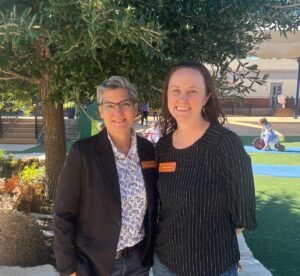When Dr. Veronica Ruiz-Winner walks into her office each morning, she carries with her a profound understanding of what it means to follow a different educational path. As the executive principal of UT Charter School’s online high school program, she leads an innovative initiative that’s helping students complete their high school journey.
“I dropped out in 10th grade,” Ruiz-Winner shares. Reflecting on an educational path that took her from receiving a GED to earning a PhD at the University of Texas at Austin, she knows that success doesn’t always follow traditional routes.
That understanding shapes every aspect of UT Charter’s online program, which launched as a pilot last year and has already graduated ten students. During the pilot year, the online program served over 80 students who completed 214.5 credits. What began as an initiative for students transitioning out of UT Charter’s partner care facilities has evolved into a lifeline for any student who needs education delivered differently.
The Importance of Human Connection
The program operates on the Edgenuity™ platform through Imagine Learning, but what sets it apart isn’t the technology—it’s the human element. Each student is assigned a success coach who becomes their advocate, guide, and consistent point of contact.
Ashley Johnson, the dropout recovery coordinator and success coach, has been with UT Charter since 2010. She interfaces with both parents and students to ensure they’re enrolled in the right classes and staying on track.
“When things get tough and they’re stressed out, or the parent is stressed out, not understanding how to navigate the education side of things, I’m there to help them and just kind of hold their hand through it,” Johnson explains.
Success coaches track student progress, notice when someone hasn’t logged in for days, and reach out to understand what’s happening. “I will reach out and say ‘Hey, I noticed you haven’t logged in in two days. What’s going on?'” Johnson describes.
This personal attention has proven crucial. Johnson recalls two students close to graduating but ready to abandon their education entirely last spring. Both were turning 18 and didn’t realize they could continue after completing intensive in-patient programs. Although they didn’t graduate in spring, they should finish by December.
“Our program is giving them that second chance whenever they thought all hope was lost,” Johnson explains. “It’s really easy to feel isolated when you’re just logging into your computer and working online. Students really need that extra support, knowing that there is still someone watching them and there for them.”
The program incorporates the Neurosequential Model of Education (NME)™ and trauma-informed practices, creating an environment where emotional safety supports academic success.
Academic Excellence and Flexibility
Academic rigor remains uncompromised. Students follow customizable degree plans meeting Texas Foundation High School requirements. One student scored an 87 on a credit-by-exam test but insisted on taking the actual course to earn an A for military admission. The program supported his drive for excellence.
The program’s success lies in its refusal to embrace deficit thinking. “We don’t know the situations of these kids,” Ruiz-Winner emphasizes. “So we always keep positive intent and ask, ‘How can we help you?'”
As UT Charter’s online high school prepares for its second full year, Ruiz-Winner remains focused on the mission: “We now have a large group of kids that are gifted, talented, have the skills, knowledge, want, and will, but they just need to learn slightly differently. In a traditional education system where one-size-fits-all approaches often leave students behind, UT Charter Schools’ programs offer hope that every learner can find their path to success.”


